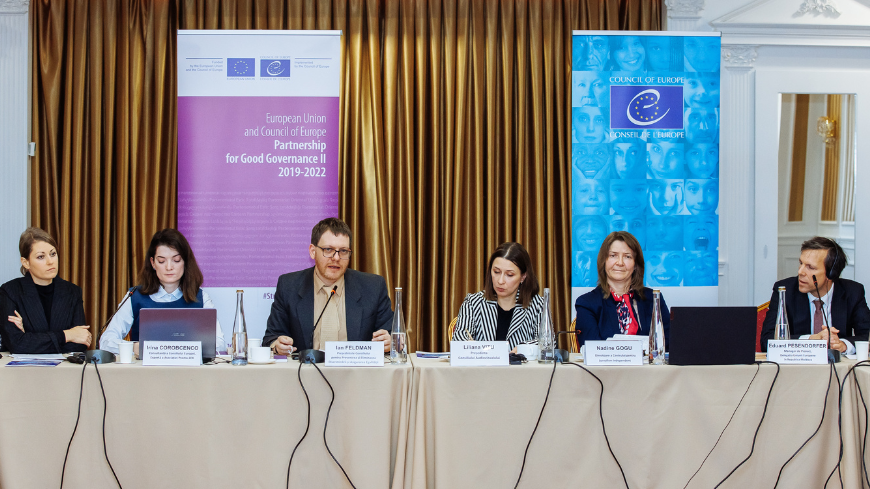The presentation of the Guide on combating hate speech in the media in the Republic of Moldova was organised by the joint European Union and the Council of Europe project “Strengthening access to justice through non-judicial redress mechanisms for victims of discrimination, hate speech and hate crimes in the Eastern Partnership”, part of the programme “Partnership for Good Governance II, 2019-2022, in cooperation with the Audiovisual Council.
The event brought together the members and staff of the Audiovisual Council, media stakeholders, representatives of state and non-state actors in the field of anti-discrimination to present the guide and to strengthen the platform of communication among the media actors in the Republic of Moldova, in view of preventing and combating hate speech when appearing in audio-visual media. In the opening and closing part, the following remarks were made by:
“In the times when the hate speech is increasing, both offline and online across the whole continent, it is essential that states and all relevant actors contribute to the improvement of legal and institutional framework, but also to practices addressing these challenges. This Guide is a step forward in that direction. It contributes to the skills of the Audiovisual Council, but also of media broadcasters and other stakeholders to recognise and deal with the hate speech issues in line with European standards, also important from the new European perspective of the country”, mentioned William MASSOLIN, Head of the Council of Europe office in Chisinau.
“The EU welcomes the publication of the Guide for assessing and processing hate speech cases, which was created by the Council of Europe under the EU-Council of Europe Partnership for Good Governance. This guide provides advice, directions and recommendations to Moldovan authorities on practical questions related to evaluating, decision-making, sanctioning, and the creation of statistical data on individual cases in Moldova. As such, it serves as a valuable source of reference in their daily work. The EU remains committed to support the fight against hate crime and hate speech, which negatively affects individual victims and pluralistic societies in whole”, stated Eduard PESENDORFER, Project Manager, European Union Delegation in the Republic of Moldova.
“The Guide on Combating hate speech in the media in the Republic of Moldova presented today, is a tool to support the Audiovisual Council and other authorities from the Republic of Moldova. It can help us in monitoring cases of hate speech in the audiovisual environment and in combating unacceptable forms of expression in audiovisual programmes and services”, highlighted Liliana VIȚU, Chair of the Audiovisual Council of the Republic of Moldova.
As concluding remarks, participants agreed upon the future directions of joint work on combating hate speech in the media environment in the Republic of Moldova, highlighting the importance of synergies and common efforts to ensure prevention of hate speech, especially in the public sphere. The adoption of this Guide as an official methodology of the Audiovisual Council of the Republic of Moldova will allow for a new, efficient mechanism for monitoring, assessing and processing potential hate speech cases in the media by the regulatory authority and contribute to combating inacceptable forms of expression in audio-visual media programmes and services in the Republic of Moldova, especially protecting vulnerable groups.
The Guide and the event were produced/organised as part of the project “Strengthening access to justice through non-judicial redress mechanisms for victims of discrimination, hate speech and hate crimes in the Eastern Partnership”, funded by the European Union and the Council of Europe and implemented by the Council of Europe in their Partnership for Good Governance II 2019-2022. The views expressed herein can in no way be taken to reflect the official opinion of either party.





